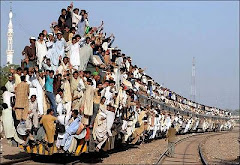Singapore Protest Exposes
Voter Worries About
Immigration
By Shamim
Adam - Feb 18, 2013 3:00 AM
GMT+1100
Singapore’s biggest political
protest since allowing these events at a downtown park in 2000 may signal
growing difficulty by Prime Minister Lee
Hsien Loong’s government to push policies without broader support.
Thousands of protesters gathered
on Feb. 16 at Speakers’ Corner at Hong Lim Park at the edge of the city’s financial district in
the rain to oppose the government’s plan to raise the population through
immigration. Lawmakers from Lee’s party, which has ruled Singapore since
independence in 1965, endorsed a white paper earlier this month that outlined
proposals to allow more foreigners through 2030 to boost the workforce.
“It’s a big red flag and they
cannot go on with business as usual, with their old way of doing things of
letting it blow over and letting emotions run their course,” said Terence Lee, who teaches politics at National University of
Singapore. “This is not an emotional hump. I won’t be surprised if significant
changes happen at the ballot box in 2016.”
The rally increases pressure on the government to slow an influx of
immigrants that has been blamed for infrastructure strains, record-high housing
and transport costs and competition for jobs. Singapore’s population has jumped
by more than 1.1 million since mid-2004 to 5.3 million and may reach 6.9 million
by 2030, based on the proposal. That stoked social tensions and public
discontent that is weakening support for Lee’s People’s Action Party. ‘Work Harder’
“They will have to work harder at
seeking buy-in rather than putting policies across as imperative,” said Eugene
Tan, assistant law professor at Singapore Management University and a
nominated member of Parliament, who said the protest is the biggest in recent
memory. “Gone are the old days where the government believes what is the right
thing to do and they don’t care what the public thinks and do what is right.
Doing what is right is no longer enough.”
Outdoor protests are banned in Singapore as authorities say the laws help
maintain social stability in a country that was wracked by communal violence
between ethnic Malays and Chinese in the 1960s. Since easing the restriction
more than a decade ago, large-scale protests at the park have centered on issues
such as losses from mini-bonds to the city’s worst subway breakdown, rather than
politics. Organizer Gilbert Goh, who promoted the event mainly through Facebook, estimated 4,000 people joined the demonstration at the 0.94-hectare (2.3-acre) park that served as a venue for political rallies in the 1950s and 1960s. They sang patriotic songs and held signs saying “we want to be heard, not herded,” and “waiting for 2016,” when the next general election is due.
Unprecedented Protest
The turnout, which he earlier estimated at as many as 5,000 two days ago, made it the biggest protest on a political issue since independence, Goh, who was an opposition party member, said in an interview yesterday.
The Workers’ Party, the only
opposition group with elected members in Parliament, said on its website the plan to spur economic growth through immigration
isn’t sustainable.
“A 6.9 million population won’t be good for Singaporeans,” said David Tan, a
48-year-old who owns a garment textile business and attended the protest. “We
have 5.3 million people and we can hardly cope. Even if the government can take
care of infrastructure, it won’t help much in terms of quality of living.” There may be as many as 6 million people in Singapore by 2020, and the government will boost infrastructure to accommodate a further increase in the following decade, according to the white paper published last month.
Angry People
“The size of the crowd shows people are angry,” said Tan Jee Say, a candidate in Singapore’s 2011 presidential election, who gave a speech at the protest. “It will send a signal to the government and I hope it will react in a sensible way and see that people are concerned.”
Protesters expressed unhappiness
with the policy that could see citizens, including new ones, making up only one
of every two people on the island smaller in size than New York City by the end
of the next decade should the population reach 6.9 million. Singapore is the
third-most expensive Asian city to live in and the sixth globally, according to
an Economist Intelligence Unit ranking of 131 cities published this month.
“Instead of increasing the population of this country so quickly, maybe we
should focus on those that have been left behind,” said Sudhir Vadaketh, author
of “Floating on a Malayan Breeze.” “A lot of Singaporeans are feeling a great
sense of loss of identity. With continued high immigration, I worry about that
sense of identity being diluted even more.” Under Pressure
In a city with 3.3 million
citizens and 2 million foreigners, complaints about overseas workers depriving
locals of jobs and driving up home prices helped opposition
parties win record support in the 2011 general election.
Interestingly, no one is accusing the people of Singapore of being 'racist' and so forth for voicing their concerns, as we see in Australia, the minute anyone mentions immigration, the multiculti scream 'racist' or 'Nazi' and the like, as in their view nothing will stand in the way of their acquisitionist agenda. Of course those who seek to gain from this multiculti immigration agenda, the politically connected big money men and their ilk, happily promote the multiculti hallucination via the breakdown of Australianness and the dispossession of Australians within their own society.
Australians should take note of the Singapore protests, as there is nothing wrong with resisting these destructive agendas, in fact if we don't resist, we won't survive.





































No comments:
Post a Comment
Note: Only a member of this blog may post a comment.